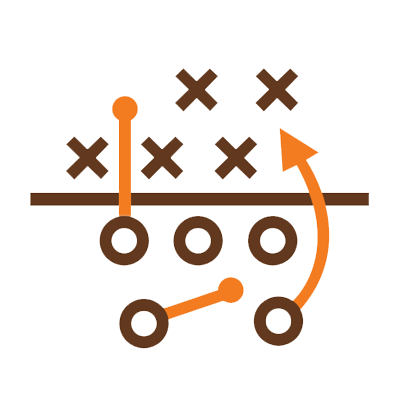Failure To Launch Program For Young Men
We Build Healthier, Happier, and Stronger Men. Over the last thirteen years, we have helped struggling young men who are failing to launch become independent.
What is Failure To Launch Syndrome?
Young men are becoming stuck and failing to launch. We can help.
How We Help With Failure To Launch Syndrome
Forte Strong is the nation’s premiere life coaching and independent living program for young men, dedicated to treating failure to launch syndrome, and the variety of individual challenges associated with Failure to Launch. Among the issues addressed: are social anxiety, avoidant personality disorder, depression, impulsivity, defiance, ADHD, low self-esteem, technology addiction, and other dependencies that keep young men from launching successfully.
A huge part of success is the belief that success is possible. Forte Strong puts great emphasis on small, but positive steps your son will take towards independence to help nurture that belief. A win, no matter how small, is empowering and enough seemingly small wins add up to HUGE success.

INDIVIDUAL THERAPY
We break down mental barriers hindering success to introduce treatments that foster growth.

GROUP THERAPY
We provide space for like-minded individuals to share challenges, and experiences, and learn coping skills together.

COACHING
We bridge the gap between therapy and reality to produce immediate results.

EXPOSURE THERAPY
We systematically expose them to fears in a controlled way to manage anxiety and sustain continued development.

REPEAT
We continue the process until we establish healthy habits, develop confidence, and sustain autonomy.
We believe that every young adult has unique strengths, interests, and goals. That's why we offer individualized programs tailored to meet the specific needs of each resident. Our experienced team works closely with residents to create personalized plans that focus on personal growth, education, career development, and independent living skills.
Depression is a stealthy intruder, invading one's life without warning. It transcends fleeting moods, delving deep into the intricate interplay of thoughts, emotions, and behaviors. It often originates from negative thought patterns, evolving into a profound abyss of despair, distorting self-perception and clouding the outlook on the world.
Behavior becomes a significant player, either as an ally or adversary. Actions, or the absence of them, can ensnare in a cycle of stagnation and isolation. Social withdrawal, neglecting self-care, and procrastination can exacerbate the condition, deepening its grip.
However, hope resides in the fact that behavior can also serve as a potent instrument for recovery. Small, intentional steps, like regular exercise, maintaining a balanced diet, and nurturing connections with loved ones, have transformative potential. Understanding the root causes of depression is crucial, as it can be triggered by genetic predisposition or life events. It's vital to explore the underlying sources of depression, fostering a deeper understanding of one's emotional landscape.
Knowledge is a powerful weapon in the battle against depression, encompassing the ability to identify its signs and symptoms, as well as comprehend the role of thoughts and behaviors. With the right guidance, one can regain mastery over their life, emerging from the battle with newfound strength and resilience. Depression is formidable, yet with a commitment to change, it can be overcome, allowing one's behavior and choices to become their greatest allies in this battle. Together, the chains can be broken, paving the way toward a brighter, empowered future.
The influence of shame and pride on a young man's self-worth is profound. Pride, in this context, represents the self-imposed expectations of what life should look like, while shame personifies the outcome as if making a mistake equates to being a mistake. This dynamic often originates from past errors or perceived inadequacies, becoming a heavy burden that gradually erodes self-esteem and cultivates a sense of unworthiness, self-doubt, and what we refer to as “limiting beliefs”. It prompts the inclination to hide one's true self from the world, triggering a cycle of isolation driven by the fear of judgment and rejection. It is 2 steps forward followed by 10 steps back.

Shame and pride collaborate, working hand in hand to rationalize behaviors by altering one's personal perception of reality, all in an effort to avoid taking ownership of any shortcomings. This serves as a method of self-preservation, an attempt to shield one's self-worth from potential damage.
The delicate interplay between these forces is critical in understanding a young man's self-worth and how it is affected. Recognizing the distinction between healthy pride that fosters growth and unrealistic expectations that hinder personal development is essential. Moreover, addressing the roots of shame, stemming from past mistakes and perceived inadequacies, is crucial for cultivating self-compassion and authentic self-esteem.
In essence, navigating the intricate relationship between pride and shame can be a transformative journey toward building a robust sense of self-worth. It involves dismantling the facade of perfection, embracing humility, and seeking support to foster a healthier, more resilient self-esteem that doesn't rely on self-deception.
Executive functioning refers to a set of mental skills that enable individuals to manage and control their cognitive processes and behavior effectively. It encompasses various crucial abilities, including planning, organization, decision-making, time management, working memory, and self-regulation. Essentially, it's the brain's "CEO" that oversees and coordinates various functions to achieve goals.
When an individual lacks strong executive functioning, they face a range of challenges in daily life. Planning and organization become arduous tasks, making it difficult to set and follow through with goals and tasks. Decision-making can be impulsive, leading to poor choices. Time management issues can result in missed deadlines and disorganization, leading to chronic stress.
Weak working memory can hamper the ability to hold and manipulate information, impacting problem-solving and learning. Self-regulation problems can manifest as difficulties in controlling impulses and emotions, potentially straining relationships and personal well-being.
In essence, poor executive functioning can affect nearly every aspect of life, from academic and professional performance to personal relationships and emotional well-being. Recognizing these challenges is the first step toward implementing strategies and support systems to help individuals compensate for their difficulties and improve their overall quality of life.
Is Your Son Struggling To Launch
“My son has grown so much since his arrival at Forte Strong!”
UNLOCK YOUR POTENTIAL
The potential lies within, but what’s the key to unlock it? Is it solely a matter of hard work and perseverance, or does the puzzle hold another piece? Have you ever wondered why one individual grapples with daily challenges while other young adults of similar age seem to achieve more effortlessly? What’s the secret? Is it destiny and misfortune, or is there a different, tangible factor… something that can be learned, comprehended, and applied? Irrespective of past or present circumstances, Forte Strong offers the tools, techniques, and training to propel off the couch, out of the confines of the home, and into the real world.

What We Do -> Failure To Launch Treatment
Video Game Addiction
AKA - Treatment For Depression
Pornography Addiction
Entitlement
ADHD
Social Anxiety
Avoidant Personality Disorder
And All The Other Factors That May Play A Part In Your Son's "Failure To Launch"
Questions You May Have
Who does Forte Strong help?
Forte Strong’s treatment program caters to young men ages 18-30 who struggle to become independent Forte Strong can get him there. The young men who attend Forte Strong have a combination of underlying issues compounding to create a low tolerance for willingly exposing themselves to uncomfortable situations that they would be capable of dealing with but just don’t want to deal with. This manifests as operating on the premise of, “What is the bare minimum I have to do in the next 24 hours to survive?” It also results in a poor ability to effectively cope when they feel overwhelmed; typically, coping consists of disengaging and immersing themselves into an escapism where they don’t have to deal with whatever is causing the discomfort. This could be video games, TV, reading books, excessive video streaming, social media, lifting weights, playing sports, art, or even work. The second common coping mechanism is to drop an emotional grenade, an excessive emotional response to blow the uncomfortable situation out of the water. The underlying issues that are compounding primarily consist of anxiety, depression, executive functioning, lack of direction, a sense of pride, and a high sense of Shame.
How long is a typical stay?
The typical duration of a stay at Forte Strong ranges from 6 to 9 months, with an average length of 7 months. This extended period enables individuals to delve deeper into the barriers they face, fostering a comprehensive understanding crucial for crafting their developmental plan. Within this timeframe, they'll have the opportunity to implement behavioral changes and cultivate a mindset that paves the way for tangible real-life experiences. The goal is to ensure a seamless transition from Forte Strong into full independence, with well-established habits that have been both developed and maintained prior to graduation.
Where is Forte Strong located?
Forte Strong is situated in the city of St. George, nestled on the southwestern edge of Southern Utah. St. George's strategic location places it less than a 2-hour drive north of Las Vegas and just 4 hours south of Salt Lake City. The region is a haven for outdoor enthusiasts who flock to Southern Utah to experience its world-renowned rock climbing, canyoneering, river rafting, mountain biking, and fishing. The area is also home to five national parks, including Arches, Zion, Canyonlands, Bryce Canyon, and Capitol Reef.
Our program is designed to immerse students in a multitude of learning opportunities, all within an environment that revolves around experiential learning. This is why we believe that Forte Strong is ideally situated to provide our students with the perfect backdrop for their personal growth and development.
Is Forte Strong a rehab?
Forte Strong does not offer detox. Nor does it work with applicants who actively struggling with illegal drugs, violence, illegal sexual activity, or severe psychological problems. Forte Strong is a life-education program that focuses on Failure to Launch Syndrome, Avoidant Personality, Social Anxiety Disorder and Adjustment Disorder as well as video game addiction, pornography, depression, low self-esteem, entitlement, affluenza, and other similar issues.
When can my son enroll?
Forte Strong is open throughout the year with a rolling admission. We work with your son on an individual one-on-one basis, meaning you won’t wait to give your son the help he needs now. We believe “there is no better time than the present to make a positive change for the future.”
Is your son right for Forte Strong?
Forte Strong works with young men who need to become independent, but they either lack the desire or are struggling in their attempts. They often rely excessively on their parents or other caretakers, avoiding adult-like responsibilities and challenges. The obstacles preventing them from moving forward in their lives include anxiety, depression, lack of direction, and a diminished sense of self-worth. These barriers create low tolerance to facing uncomfortable situations they could handle but don’t want to, coupled with ineffective coping mechanisms. Consequently, they operate with the mindset of “What is the bare minimum I have to take on in the next 24 hours to survive or get by?”.
For parents, this can be a hard thing to address because, generally speaking, their son isn’t doing anything MAJORLY wrong within a 24-hour day. If their trajectory was to be considered, it might be off by one or two degrees. However, when you stack up 100 or 300 of these days in a row, you begin to notice that the slight deviation off their intended trajectory maintained for a long time results in being severely off-course. If you were to consider the last hundred days, you would notice that the problem is substantial because nothing significant has been achieved.
If, as a parent, you feel that this is relatable, the inevitable question arises: how can they persuade their son to attend? Since they are adults, coercing them is not an option. If you can relate to this situation, complete our parent questionnaire to schedule an immediate strategy consultation. Our dedicated team has assisted hundreds of families to regain control and guide their sons on the right path. Let us help you support your son effectively.
Is Forte Strong qualified to offer therapy to my son?
YES

